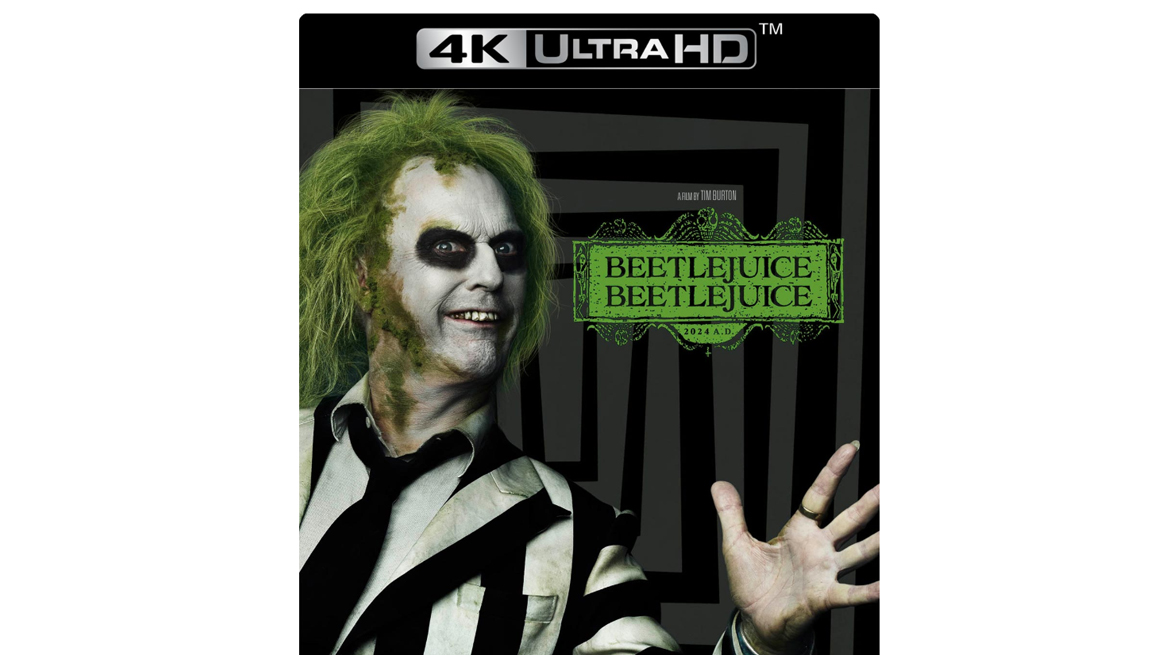TL;DR
Thirty-six years later, the Deetz family returns to Winter River, inadvertently unleashing Beetlejuice again when Lydia's daughter opens a portal to the afterlife. Michael Keaton and Winona Ryder shine, with Jenna Ortega joining as the new generation. While some supporting roles feel underused, the film delivers fun, practical effects, and Tim Burton's signature style. Visually stunning on UHD with impressive Dolby Atmos sound, it's packed with engaging bonus features. Whether you loved the original or are new to the chaos, this sequel is a highly entertaining ride that fans will adore. Dive in to see if it lives up to the hype!
In Beetlejuice Beetlejuice, we revisit the Deetz family, who, following an unexpected family tragedy, return to their house in Winter River. Lydia Deetz (Winona Ryder), still affected by the presence of Beetlejuice (Michael Keaton), attempts to navigate life after her loss. Her teenage daughter, Astrid (Jenna Ortega), inadvertently opens a portal to the Afterlife during a séance. Beetlejuice returns, creating chaos in both the living and the dead worlds. The Deetz family must then find a way to close the portal and restore equilibrium between the realms.
A significant 36 years and five months separate the release of the first and second films featuring the enigmatic Beetlejuice, or Betelgeuse, as he spells his name in the original. While this may seem like a lengthy interval, it pales in comparison to Mary Poppins and Mary Poppins Returns, which were separated by an impressive 54 years and three months!
Was a sequel to Beetlejuice truly necessary? Discussions surrounding a follow-up began soon after the first film’s release, with one early script even bearing the questionable title Beetlejuice Goes to Hawaii. Thankfully, this concept never materialized. Both Michael Keaton and Winona Ryder committed to returning for a sequel, with Ryder reportedly including a clause in her contract with the Stranger Things producers to ensure she would have time to film it.
Now, in 2024, the sequel has finally arrived, thankfully devoid of any Hawaiian settings. Noticeably absent are Alec Baldwin and Geena Davis, who played prominent roles in the original; a brief line alludes to their characters’ fate. The narrative now centers on the Deetz family, who moved into the house, much to the chagrin of the aforementioned characters. The original cast members deliver commendable performances, effectively bridging the gap between the films. New additions to the cast, such as Jenna Ortega (known for her role in the Netflix series Wednesday, also directed by Burton) and Justin Theroux, seamlessly integrate into the established world. Jeffrey Jones, who portrayed Charles Deetz in the original film, does not reprise his role. The filmmakers address this absence in a creative manner, though a slight sense of unease remains, given Jones’ controversial public image. In this instance, it might have been preferable to omit any reference to him altogether.
Willem Dafoe and Monica Bellucci also appear in the film, albeit in underutilized roles. While their characters are ostensibly crucial to the plot, their impact is minimal. It appears that their scenes may have been significantly reduced during the editing process. Bellucci’s character is presented as the film’s primary antagonist but experiences a rushed and anticlimactic conclusion that feels underdeveloped.
Beetlejuice Beetlejuice maintains a brisk pace, and while the film may not offer significant surprises, it remains enjoyable and highly entertaining. Fans of the original film will likely appreciate this sequel, which adheres to the established tone while incorporating contemporary elements. The effects are predominantly practical, with some monsters even realized using traditional stop-motion animation techniques. Keaton excels in his role, and Burton reaffirms his directorial prowess. The success that began with Wednesday continues with this latest offering.
The UHD release of Beetlejuice Beetlejuice earns high marks across the board. The image is sourced directly from the Sony CineAlta Venice 2 cameras, which record in 4K, resulting in no discernible loss or upscaling. The image quality is consistently excellent. The film leverages a vibrant color palette, and the afterlife sequences exhibit a remarkable sense of depth. Combined with Dolby Vision and HDR, this creates a visually compelling experience.
The Dolby Atmos sound design is also of reference quality, with particularly impressive sound mixing during the climactic wedding scene. The audio mixing is well-balanced, eliminating the need for constant volume adjustments during dynamic sequences.
The disc is replete with supplemental material, including documentaries ranging from ten to thirty minutes in length that cover various aspects of the filmmaking process. These features are genuinely engaging, offering insights into Tim Burton’s preference for practical effects and his limited reliance on computer-generated imagery. The inclusion of a commentary track is a welcome addition.
In conclusion, I recommend Beetlejuice Beetlejuice to both longtime fans and newcomers. The film offers substantial entertainment value, and its minor shortcomings do not detract significantly from the overall experience. A potential future project for Tim Burton could be a Batman Beyond film starring Keaton as an older Bruce Wayne. His performance in The Flash demonstrated the viability of this concept.
SF Studios provided review copies for this assessment. Material providers do not influence our editorial process. We maintain an independent perspective, prioritizing the interests of our readers and consumers.

